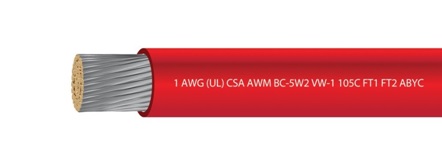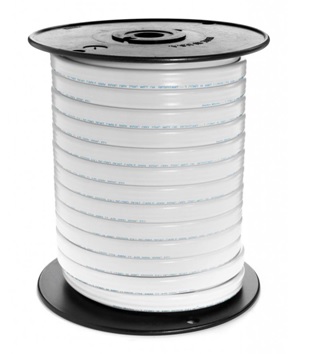The Importance of Quality Marine Electrical Cable for Safety at Sea
8th May 2023
Marine electrical cables are essential components of any marine vessel's electrical system. However, many boat owners underestimate the importance of using high-quality marine cables for their safety at sea.
Faulty wiring can lead to catastrophic consequences, including electrical fires, electrocution, and even sinking. Therefore, it is crucial to use quality cables to prevent such accidents from happening.
In this article, we will discuss the importance of using quality marine electrical cable for safety at sea.
The dangers of using low-quality marine electrical cables
Using low-quality cables can lead to several hazards that can put your safety and your vessel at risk. Inferior cables are prone to overheating and can cause electrical fires that can quickly spread throughout your vessel, putting the lives of everyone on board in danger.
Additionally, low-quality cables are more likely to corrode and wear out quickly, leading to electrical shorts, which can also lead to fires or even cause the vessel to sink.

Benefits of using high-quality marine electrical cables
Using high-quality marine electrical cables can prevent hazardous accidents and provide several benefits to the vessel and its occupants.
Quality cables are made with durable materials that can withstand harsh marine conditions, such as saltwater, sunlight, and temperature fluctuations, without corroding or deteriorating quickly. Additionally, quality cables offer better conductivity, reducing the risk of overheating and fires.
Top Tips for Properly Installing Marine Electrical Cable on Your Boat
Installing marine electrical cable on your boat can be a challenging task, but it's crucial to ensure the safety and optimal performance of your vessel's electrical system. Proper installation of cables can prevent electrical hazards, such as electrocution, fires, and damage to equipment.
To make sure that you're installing your electrical cables correctly, then, here are some essential tips to take note of:
1. Choose the right type of marine electrical cable:
The first and most important step in properly installing marine cables is choosing the right type of cable. When it comes to marine cables, there are specific standards and requirements that must be met to ensure safety and compliance with regulations.
The marine environment can be harsh, with exposure to saltwater, moisture, and other corrosive elements. Therefore, electrical cables must be designed to withstand these conditions and remain operational in the event of an emergency.

One of the most important standards to look for when choosing marine electrical cables is UL, which stands for Underwriters Laboratories. UL is a globally recognized organization that tests and certifies products for safety and compliance with industry standards. Marine cables that meet UL standards have been rigorously tested and approved for use in marine environments.
Another important standard to consider is USGC, which stands for the United States Coast Guard. USCG-approved marine electrical cables have been tested to ensure that they meet strict safety and performance standards. These standards cover a wide range of criteria, including flame resistance, electrical conductivity, and resistance to oil and moisture.
2. Determine the cable size and amperage rating:
When selecting marine cables, it's also important to consider the vessel's electrical system's power requirements.
First, determine the cable size and amperage rating required for your boat's electrical system. The cable's size and amperage rating should match the power requirements of the vessel's electrical system.
Choosing the wrong size or amperage rating can result in electrical hazards, such as overheating, which can cause fires or damage to equipment.
3. Plan the cable routing:
Before installing the electrical cable, it's crucial to plan the cable routing. The cable should be routed in a way that avoids sharp edges, heat sources, and other potential hazards.
The cable should also be secured properly to prevent it from rubbing against other cables or equipment.
4. Use proper connectors and terminals:
Using proper connectors and terminals is crucial for a safe and reliable marine electrical system. The connectors and terminals should be compatible with the cable size and amperage rating.
It's essential to crimp the connectors and terminals properly and use a heat gun to shrink the heat shrink tubing.
5. Test the electrical system:
After installing the electrical cable, it's crucial to test the electrical system to ensure it's working correctly. Testing the electrical system can help identify any issues, such as voltage drops, that can cause electrical hazards.
Properly installing electrical cable is crucial to ensure the safety and optimal performance of your boat's electrical system.
By following these top tips, you can ensure that the marine electrical cable is installed correctly, preventing electrical hazards and damage to equipment.

How to Maintain and Care for Your Marine Electrical Cable
Now, like all equipment, marine electrical cables can wear down over time, leading to reduced performance and safety hazards. To ensure your cable operates efficiently and safely, you need to follow a regular maintenance routine.
1. Inspect Your Cables Regularly
To maintain your cables, you need to conduct routine inspections. Check for any signs of damage, such as frayed or cut insulation, loose connections, or corroded wires. If you find any issues, address them immediately to prevent further damage.
2. Clean Your Cables
Marine environments are tough on electrical cables. Saltwater, dirt, and grime can accumulate on your cables, leading to corrosion and reduced performance.
Regularly cleaning your electrical cables can help prevent these issues. Use a soft-bristled brush and mild detergent to clean your cables, ensuring that you rinse them thoroughly with freshwater.
3. Protect Your Cables from the Elements
Exposure to the elements is one of the biggest threats to the longevity of marine electrical cables. Make sure you store your cables properly when not in use and protect them from UV rays, heat, and moisture. Consider using protective covers or sleeves to help extend the life of your cables.
4. Avoid Overloading Your Cables
Overloading your electrical cables can lead to overheating, melting, or even fire. Always ensure that you do not exceed the cables' ampacity rating and avoid using extension cords or adapters to increase the length of the cable. If you need to increase the cable length, consider upgrading to a thicker cable.
By following a regular maintenance routine, you can extend the life of your marine electrical cables, ensuring that your boat's electrical system operates safely and efficiently. Remember to inspect your cables regularly, clean them, protect them from the elements, and avoid overloading them.
The importance of using quality marine electrical cables for safety at sea cannot be overstated.
Using low-quality cables can put the vessel and its occupants at risk of electrical hazards, while using high-quality cables and proper installation practices can prevent hazardous accidents and provide several benefits to the vessel's electrical system's performance.
Therefore, boat owners must prioritize quality when choosing marine cables for their vessels. At EWCSwire, we offer high-quality marine electrical cables that meet industry standards and provide optimal performance and safety for your vessel.

